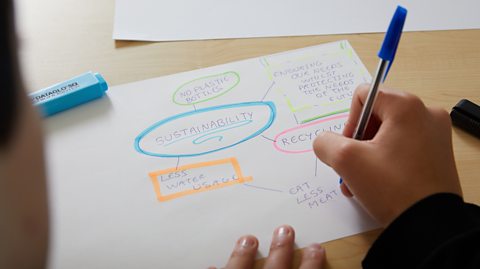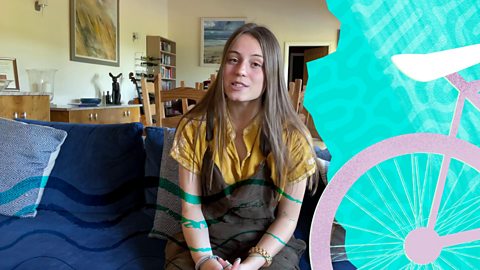
Welcome to The Regenerators.

If you ever feel worried about climate change, you're not alone.
In September 2021, a global survey led by Bath University found that nearly 60% of 16-25-year olds felt very worried or extremely worried about climate change, with more than 45% saying this affected their daily lives. The same survey also showed that two-thirds reported feeling sad, afraid and anxious.
Terms like ‘climate anxiety’ or ‘eco-anxiety’ are widely used to describe the psychological effects of climate change.

Caroline Hickman, a psychotherapist and member of the Climate Psychology Alliance, says that, actually, “having a strong emotional response to climate change, including climate anxiety, means you care about the world and are in touch with what's happening. It’s not a bad thing to feel.”
One popular way young people are choosing to come to terms with their climate anxiety is to channel it into positive actions. According to Clover Hogan, founder of youth climate platform Force of Nature, “climate anxiety can be a catalyst for change.”
Here are some tips on how to process your worries about climate change and how to turn them into actions.

Acknowledge how you feel
If you can’t put your finger on what it is exactly that you are worried about or feeling, try writing it down.
You could even record yourself talking about how you feel or even draw your feelings - sometimes it's hard to find the words.
It doesn’t have to be coherent or detailed so just write or say or draw whatever comes up - you don’t need to show it to anyone. You may discover a whole new set of words to help you describe your feelings toward climate change.

Talk to an adult
A recent survey by Teach The Future found that over 90% of teachers are worried about climate change. Plus, according to the Department for Business, Energy & Industrial Strategy, 80% of the UK public said they were fairly or very concerned too.
So, it’s likely that at least one of the adults in your life will be able to understand where you are coming from. Sharing how you feel with them can help you feel less lonely.
If you didn’t get the response you were looking for from them or whoever you talk to, don’t give up – try telling another adult, speak to a close friend or join an online climate support group.
Limit your exposure to climate news
If you care about the planet, it may seem impossible to avoid the scary news. We’re bombarded by a constant stream of information all day, every day. From dog memes to images of deforested lands, it can be hard to pick and choose what you want to see online. But it’s not impossible.
Samia Dumbuya, an environmental activist, says there are ways you can limit your exposure to climate news. “Limit how many articles you read a day or set a timer on how long you spend reading the news.”

Actively look for solutions
When you do read the news, try to find inspiring and empowering stories about climate change.
People all over the world are working together to address the crisis.
In the UK, we are building our first-ever National Marine Park to combat climate change, restoring habitats and storing carbon and rewilding large parts of Scotland. The UK government has also committed to reducing our carbon emissions by 78% by 2035, with the aim to produce ‘net zero’ emissions by 2050.
19-year-old youth climate activist Noga Levy-Rapoport encourages young people to approach climate change in a solutions-oriented way. She said, "This crisis is real and it’s happening now, but you need to find out what innovations are happening and need to happen, and what opportunities there are for young people like you to make a difference in decision making.”
Doing this can help you get out of ‘problem mode’, challenge your assumptions, stay hopeful and maybe even inspire you to take action.

Connect with nature
Nature is so beneficial for our mental health, yet a Natural England survey found that nearly a quarter of children spend time outside in nature less than once a month.
A study carried out by White et al. in 2019 suggested that just 2 hours a week spent outside – whether that’s all in one go or over a few days – can help boost your wellbeing.

Spending time in nature can also encourage positive environmental attitudes and behaviour. Charlotte Boggon, a Young Trustee at YPTE (Young People's Trust for the Environment), is a big advocate of parks and green spaces in her local area. She says, “Knowing these areas may not stay the same because of climate change reminds me of the connection between this global crisis and the places I love.”
Be the change you want to see
Before deciding to do something about climate change, one thing to bear in mind is that there are some things you simply can't change or have no control over. That’s a fact, and that’s okay.
However, you can still influence people and make a huge difference. Write down or think about what you can and can’t do. For example, you can try not to waste food or you can write to your headteacher about the ways the school could be more environmentally friendly, but it'll be impossible for you personally to persuade every car owner to switch to electric cars.
You don’t have to do anything or everything when it comes to climate change. But if you want to, there’s something for everyone, and every small thing makes a difference.

Make a difference
Discover more about the planet and how to protect it with the BBC.
How to use your voice to make a difference
THE REGENERATORS

How to inspire others to care about the climate crisis
THE REGENERATORS

How to drive change in your community
THE REGENERATORS

Back to The Regenerators
BBC BITESIZE
